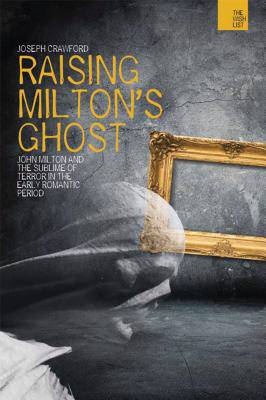
Je cadeautjes zeker op tijd in huis hebben voor de feestdagen? Kom langs in onze winkels en vind het perfecte geschenk!
- Afhalen na 1 uur in een winkel met voorraad
- Gratis thuislevering in België vanaf € 30
- Ruim aanbod met 7 miljoen producten
Je cadeautjes zeker op tijd in huis hebben voor de feestdagen? Kom langs in onze winkels en vind het perfecte geschenk!
- Afhalen na 1 uur in een winkel met voorraad
- Gratis thuislevering in België vanaf € 30
- Ruim aanbod met 7 miljoen producten
Zoeken
Raising Milton's Ghost
John Milton and the Sublime of Terror in the Early Romantic Period
Joseph Crawford
Paperback | Engels
€ 88,45
+ 176 punten
Uitvoering
Omschrijving
Why was Milton so important to the Romantics?
How did 'Milton the Regicide', a man often regarded in his lifetime as a dangerous traitor and heretic, become 'the Sublime Milton'?
The late eighteenth century saw a sudden and to date almost undocumented craze for all things Miltonic, the symptoms of which included the violation of his grave and the sale of his hair and bones as relics, the republication of all his works including his political tracts in unprecedented numbers, the appearance of the poet in the works, letters, dreams and visions of all the major British Romantic poets and even frequent reports of hauntings by his ghost.
Drawing on the traditions of cultural, intellectual and bibliographic history as well as recent trends in literary scholarship on the romantic period, Joseph Crawford explores the dramatic shift in Milton's cultural status after 1790. He builds on a now significant literature on Milton's legacy to the Romantic poets, uncovering the cultural historical background against which the Romantics and their contemporaries encountered and interacted with Milton's reputation and works.
How did 'Milton the Regicide', a man often regarded in his lifetime as a dangerous traitor and heretic, become 'the Sublime Milton'?
The late eighteenth century saw a sudden and to date almost undocumented craze for all things Miltonic, the symptoms of which included the violation of his grave and the sale of his hair and bones as relics, the republication of all his works including his political tracts in unprecedented numbers, the appearance of the poet in the works, letters, dreams and visions of all the major British Romantic poets and even frequent reports of hauntings by his ghost.
Drawing on the traditions of cultural, intellectual and bibliographic history as well as recent trends in literary scholarship on the romantic period, Joseph Crawford explores the dramatic shift in Milton's cultural status after 1790. He builds on a now significant literature on Milton's legacy to the Romantic poets, uncovering the cultural historical background against which the Romantics and their contemporaries encountered and interacted with Milton's reputation and works.
Specificaties
Betrokkenen
- Auteur(s):
- Uitgeverij:
Inhoud
- Aantal bladzijden:
- 272
- Taal:
- Engels
Eigenschappen
- Productcode (EAN):
- 9781474245128
- Verschijningsdatum:
- 18/06/2015
- Uitvoering:
- Paperback
- Formaat:
- Trade paperback (VS)
- Afmetingen:
- 156 mm x 234 mm
- Gewicht:
- 385 g

Alleen bij Standaard Boekhandel
+ 176 punten op je klantenkaart van Standaard Boekhandel
Beoordelingen
We publiceren alleen reviews die voldoen aan de voorwaarden voor reviews. Bekijk onze voorwaarden voor reviews.









